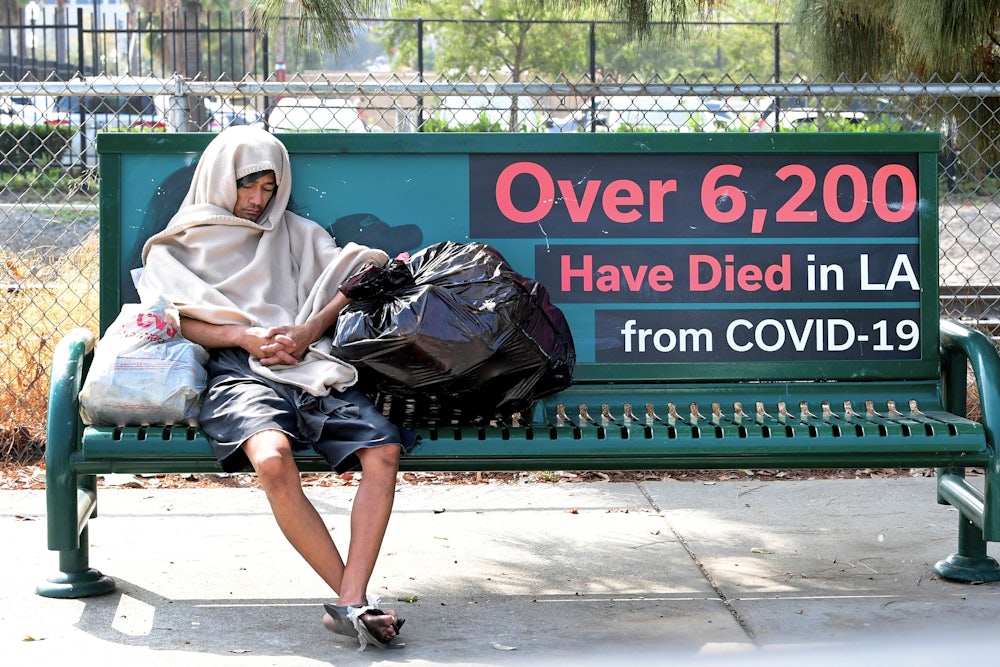Congress is fighting over whether the $3.5 trillion proposal is going to get just a little trim or
a serious haircut. Most media reports and most Democrats list some combination
of the following benefits and investments the plan would bring: childcare,
universal pre-K, free community college, and more funding to address the
climate crisis. These are groundbreaking investments, for sure.
But one major issue is largely ignored: housing. Almost no coverage discusses the 750,000 housing vouchers to help prevent evictions and a rise in homelessness, or the $80 billion to fix dangerously dilapidated public housing, which is the country’s only supply of permanently affordable housing. Advocates are trying to change that. On Wednesday, activists are holding protests nationwide, including in Majority Leader Chuck Schumer’s Brooklyn neighborhood, to save funding for housing.
The vouchers would help staunch some of the bleeding of the Supreme Court’s blow to the Center for Disease Control and Prevention’s eviction moratorium that would keep people in pandemic-ravaged communities in their homes. That fight got huge coverage, but the impact of the budget debates on one of the most pressing catastrophes we face has received little attention.
A friend of mine was homeless for years. During the pandemic, with hotels shuttered, he got a room in a hotel instead of a very expensive bed in a dangerous congregate shelter. And now he is no longer homeless because he has an apartment, thanks to a housing voucher.
Sadly, his story is an unusual one. The homeless are largely the evicted, and this nation has a massive eviction crisis we are failing to face down if Congress doesn’t deliver on housing vouchers and investments. Housing costs are a problem across race and states. Even before the pandemic, almost four million people faced eviction proceedings each year. Today, according to the Center on Budget and Policy Priorities, almost 10 million are at least one month behind on rent, and half of them believe eviction proceedings are likely.
The funding to stem the tide and help people stay in their homes and preserve affordable units helps everyone. But too many such households are Black, Latino, and headed by women. This is not surprising. In 2018, no one working a full-time minimum wage job could afford a two-bedroom apartment in practically any county in the country, and half of all renters were paying more than what the federal government considers affordable.
Women of color are most likely to be in minimum wage jobs. Over half of Black and Latino people in this country can’t afford the rent compared to 42 percent of Asian and white people. While these are staggering numbers, the Princeton Eviction Lab found that Blacks and Latinos, particularly women, were more likely than their white counterparts to face eviction proceedings. Federal help for low-income housing, particularly for the very needy, is perceived as being about Blacks and Latinos because the need is so great. So while white people benefit, 46 percent of housing vouchers go to Black and Latino households, and two-thirds of public housing households are Black and Latino. Don’t their lives matter?
It should be good politics to solve deep and shared problems like housing affordability, but unfortunately the Biden administration has treated rental assistance as separate from an affordable housing plan. That may be a political mistake. Democrats should not forget Trump has weaponized this nation’s tragic and preventable homeless crisis. Remember that even before the pandemic, Trump attacked Democratic governors and some Democratic mayors on the homeless rates in their states and cities, suggesting that what was needed was a police crackdown. Homeless rates were listed in the effort to recall California Governor Gavin Newsom from office.
It’s also a policy mistake to separate rental assistance from affordability. The truth is that it is rising rents and stagnating wages that have increased homeless rates. We need to build more affordable housing, but we can’t build our way out of this crisis. For example, the Department of Housing and Urban Development announced a plan that would create another 20,000 units by 2027 for a problem that tens of millions face. Therefore, the right policy approach includes rental assistance and preserving affordable housing, like public housing, as well.
Another pressing issue is the living conditions faced by the nation’s 1.2 million residents of public housing. Build Back Better includes $80 million to preserve funding to make the horribly crumbling housing livable. Will that be cut, too?
Not only must Democrats in Congress recognize the humanitarian and political benefits of stemming evictions and preserving public housing, but state and local government must be bolder and create new ways of addressing this inequality crisis. When I announced my candidacy for mayor of New York City in October 2020, it was with a burning desire to make New York affordable for its residents. After all, the pulse of this city, and communities around the country, comes from its people. We are one of the most diverse cities in the country, with 800 languages spoken here and all the cultural vibrancy that creates. We are the home to hip-hop, as the Verzuz between Big Daddy Kane and KRS-ONE showed. Diversity drives culture and attracts business and tourism, but it also helps us contribute 8 percent of the nation’s gross domestic product. Losing our residents to high-end housing is an existential crisis. I proposed to subsidize the rents for renters so that no one paid too much for housing, and I would use federal bailout money and the cost savings from catastrophically expensive welfare hotels to pay for it.
Vouchers and subsidies have their challenges. Only one in four people eligible for vouchers actually gets one, and landlords often discriminate against them, particularly if they are held by people of color. And there is the issue of preventing landlords from price gouging the public coffers because of subsidies. But these are good problems to have, which, when faced, can be solved. Let’s start with a rigorous Build Back Better program that includes an eviction-prevention and affordable housing strategy and show this country that Democrats can get housing done.


